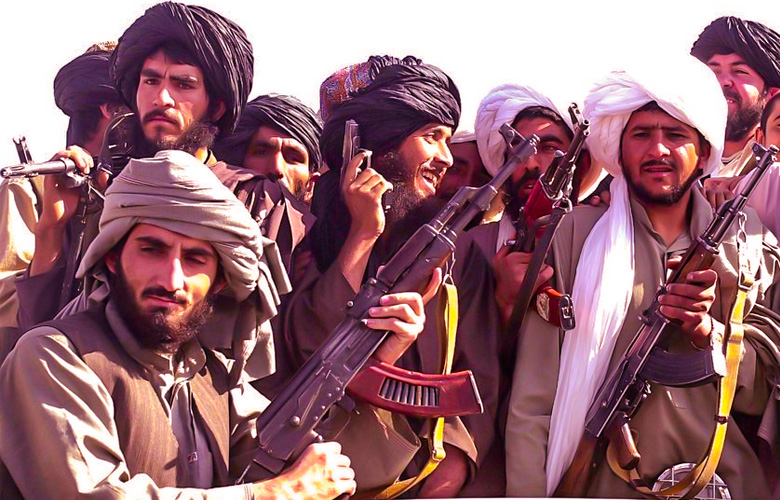AhlulBayt News Agency - The four-party meeting of Afghanistan peace has been held by the presence of representatives of the US, China, Pakistan and Afghanistan but Taliban has not yet declared reediness for taking part in the peace process and essentially it is pessimistic about the negotiations. The militant group believes that the political, security and military problems as well as the violence as a whole are deriving from the US and its allies and that Washington is not seeking a real peace deal in Afghanistan. In its latest statement the group has said that “the US has illegally occupied Afghanistan, killed hundreds of thousands of our fellow citizens and committed millions of other crimes in the country and this process is ongoing with growing violence.”
Afghanistan’s Taliban thinks that the US and the Afghan government do not want to see peace in the country, rather, they are trying to weaken the militant group in the battlefield in a bid to force it to accede to the peace process terms. Moreover, Taliban sees Pakistan as not having an honest approach to the negotiations, therefore, they are not ready to participate in the peace talks under a Pakistani administration. So far, four rounds of four-party peace negotiations have been held with the intention of finding a way for the peace road map and negotiating the hurdles ahead of a peace deal between the Afghan government and Taliban militant group.
The negotiating parties have reached some accords in the fourth round of four-party talks on the place and time of direct talks between Afghanistan’s government and Taliban’s representatives. They have decided that the representatives of the Afghan government would meet and talk with the key representatives of Taliban group face-to-face in the Pakistani capital Islamabad in mid-March. As part of the upcoming dialogue arrangements, the Afghan government has handed in a 10-member list to Pakistan so that they represent Kabul in the direct peace dialogue.
Also, Talban has made the same list which included such figures as the chief of the group’s political office in Qatar Sher Mohammad Abbas Stanikzai, the group’s former head of political office in Qatar Syed Tayyab Agha, Nik Mohammad and Abdul Salam Hanafi, also members of Taliban’s office in Qatar, Mullah Akhtar Mohammad Mansour, Taliban’s leader, and two of his commanders, Mullah Akhtar Mansour’s deputy Sirajuddin Haqqani, the member of Haqqani Network Haj Mohammad Ebrahim, Mullah Muhammad Rasul and his deputy Abdul Manan Niazi.
However, as the list of names was published, Taliban’s political office has issued a statement, denying that the group had any intention to take part in the peace negotiations, adding that not only the leader of Taliban Mullah Akhtar Mansour has not authorized any member of the group to enter peace negotiations with the Afghan government but also the group’s political office in Qatar had no information about any timeline set for the negotiations. On the other side, some news have been appearing, noting that there were some efforts underway by the country’s High Peace Council and the Afghan government and that some secret negotiations have been held with Taliban’s political representatives in Qatar.
But the fact is that Taliban is still insisting on its precondition for dialogue that the foreign forces must be pulled out of Afghanistan. The militant group has said that it would join the peace talks should there would be a timeframe set for withdrawal of the American forces. Vahid Mojdeh, an Afghan political analyst, like some other political experts believes that Taliban is concerned about the guarantee for the decisions made in any upcoming peace dialogue with the Afghan government. Mr. Mojdeh, like the former Afghan President Hammed Karzai, adds that to provide the militant group with such a guarantee, there must be a third conference, he calls it P6+1, held with the presence of the representatives of Russia, India and Iran, because these three countries are able to press the US for guaranteed withdrawal timetable, otherwise, the four-party negotiations would prove a failure as there are divides between the participants, and it is predicted that in the future, the four-party negotiations would not bring forth any specific outcome.
What can be highlighted at the end of this short analysis is that the peace process could see the light only when there would be a zero foreign intervention, especially by the US, in Afghanistan. Furthermore, the other parties, including the internal and foreign sides, need to take part in the dialogue while holding an honest approach to the peace. But the evidences suggest that Afghanistan would continue to see wide-ranging crisis. For an array of reasons, the US does not want to provide security and peace in Afghanistan and this is why so far Washington has not shown any willingness for the same purpose. It is unlikely that a peace agreement is brokered with Taliban.
The Americans hold other options for replacing Taliban and for keeping insecurity prevalent in Afghanistan. Recently, the US officials have spoken about a re-activated al-Qaeda’s role in Afghanistan. They also highlight ISIS terror group’s increasing role in the country. Unfortunately, in some cases, President Ashraf Ghani’s government walks in line with the US’ positions and talks about return of al-Qaeda, an issue which could give pause for thought.
/129
source : Al Waqt News
Thursday
10 March 2016
7:07:46 AM
740095

Afghanistan’s Taliban thinks that the US and the Afghan government do not want to see peace in the country, rather, they are trying to weaken the militant group in the battlefield in a bid to force it to accede to the peace process terms.
